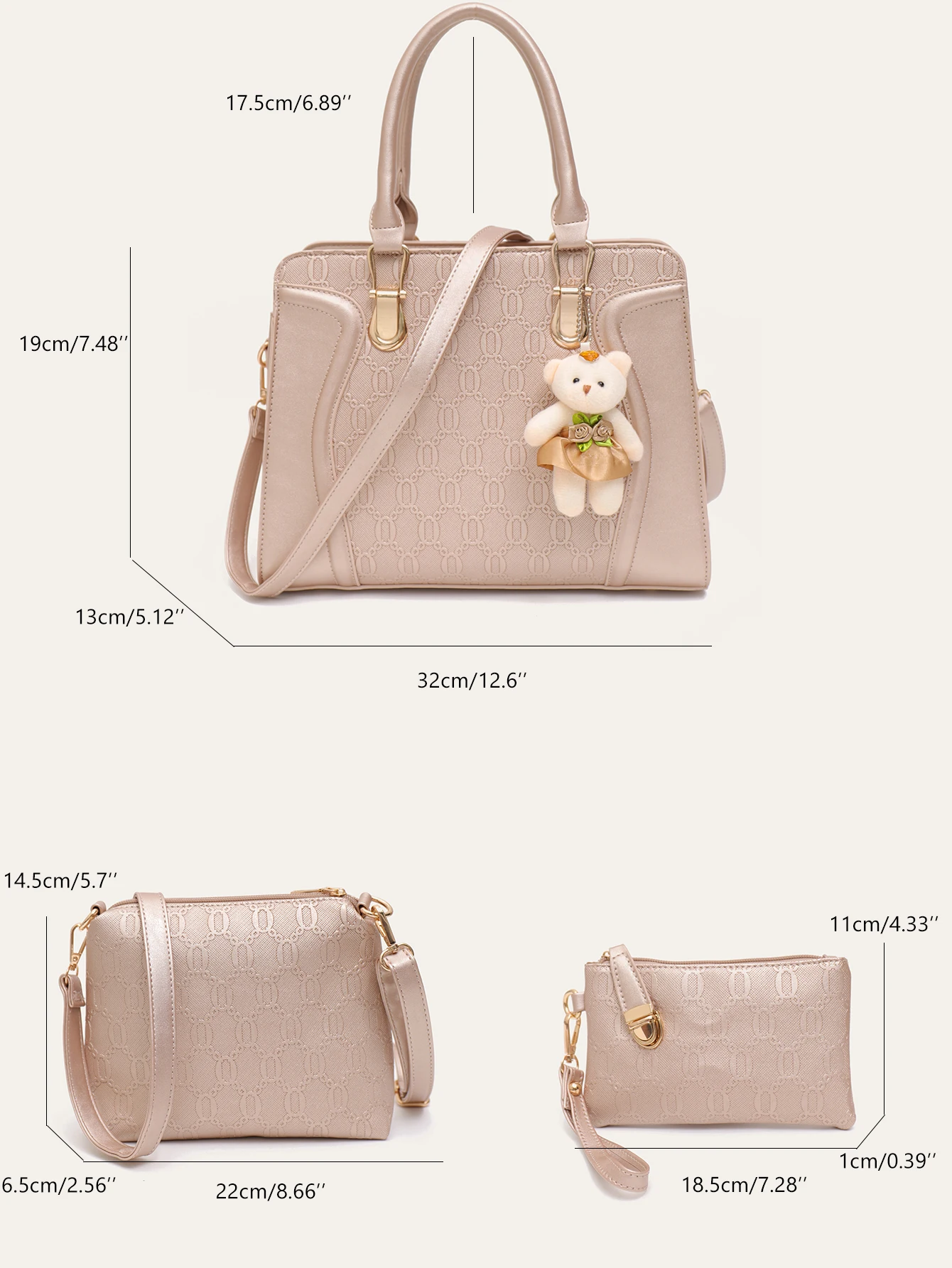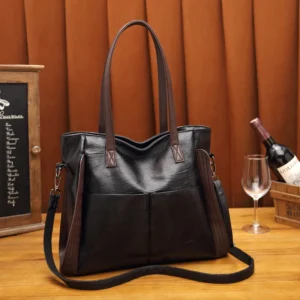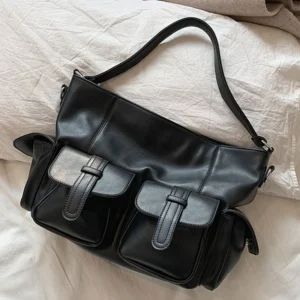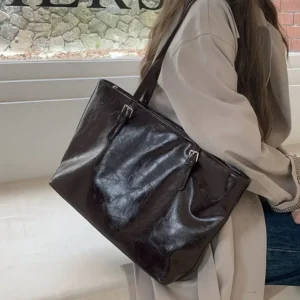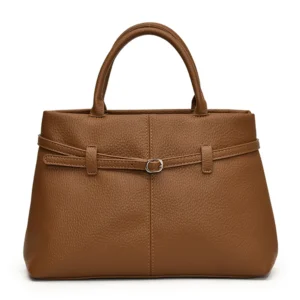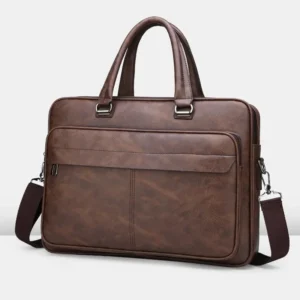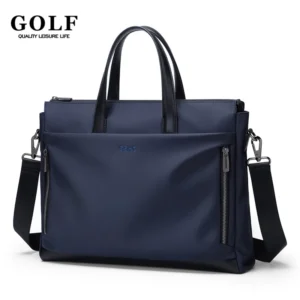The Modern Professional’s Dilemma: Style, Function, and Consciousness
Today’s professionals face a unique challenge when selecting work accessories: finding options that showcase their personal style and meet practical needs while also reflecting their ethical values. As environmental awareness grows, many are seeking eco-friendly alternatives to traditional leather work bags.
The quest for sustainable professional accessories is more than just a passing trend. Traditional leather production carries a significant environmental burden, with some studies suggesting the leather industry contributes nearly 10% of the carbon footprint associated with fashion accessories. Beyond environmental concerns, many professionals are also looking to align their purchasing decisions with personal values regarding animal welfare.
This growing consciousness has sparked innovation across the industry, with designers creating sophisticated, high-performing work bags that no longer force professionals to choose between ethics and aesthetics. The good news is that making the switch to non-leather alternatives doesn’t mean sacrificing the distinguished look of classic leather briefcases that professionals have relied on for decades.
In this guide, we’ll explore:
– Innovative sustainable materials revolutionizing professional accessories
– Essential features that make eco-friendly work bags truly functional
– Top brands creating premium non-leather options
– How to select the perfect bag that balances your values with professional needs
The journey toward more ethical professional accessories begins with understanding the options available. The benefits of vegan leather alternatives extend beyond ethics to include innovations in durability, aesthetics, and functionality that might surprise even the most discerning professionals.
Understanding Eco-Friendly Non-Leather Materials
What Makes a Material Truly Eco-Friendly?
True sustainability goes beyond simply avoiding animal products. The most environmentally sound materials consider multiple factors: renewable resource use, minimal chemical processing, low water consumption, reduced carbon emissions, and end-of-life biodegradability. Understanding these distinctions helps identify which alternatives offer genuine environmental benefits versus those that merely replace one environmental concern with another.
Traditional Synthetics vs. New Innovations
Conventional synthetic leathers, primarily made from PVC (polyvinyl chloride) or PU (polyurethane), have long served as leather alternatives but carry their own environmental concerns including fossil fuel dependence and poor biodegradability. However, recent innovations have transformed the landscape of vegan leather alternatives, creating options that perform beautifully while minimizing environmental impact.
Plant-Based Leather Alternatives
Piñatex: Derived from pineapple leaf fibers—agricultural waste that would otherwise be burned—this innovative material requires minimal additional resources to produce. Its natural texture provides a sophisticated appearance ideal for professional settings.
AppleSkin™: Created using recovered apple waste from the juice industry, this material combines fruit byproducts with polyurethane to create a supple, leather-like material with reduced petroleum dependence.
Cactus Leather: Made from the mature leaves of nopal cactus plants (which regrow quickly without irrigation), this material offers excellent durability with substantially lower water requirements than traditional leather.
Cork: Harvested sustainably by stripping the outer bark of cork oak trees without harming the tree itself, cork offers natural water resistance, lightweight flexibility, and distinctive visual appeal.
Recycled Materials
rPET (Recycled Polyethylene Terephthalate): Created from post-consumer plastic bottles, this material diverts waste from landfills while requiring significantly less energy to produce than virgin polyester.
ECONYL®: Regenerated nylon made from recovered fishing nets and other nylon waste, offering performance comparable to new nylon with dramatically reduced environmental impact.
Upcycled Textiles: Repurposed materials like vintage fabrics, decommissioned fire hoses, or industrial waste textiles create unique, characterful bags while extending material lifecycles.
Organic Textiles
Hemp: One of the most environmentally friendly crops, hemp grows quickly without pesticides and enriches rather than depletes soil. It creates durable fabrics perfect for structured work bags.
Organic Cotton: When grown without synthetic pesticides or fertilizers and processed using water-conserving methods, cotton provides a classic, professional appearance with reduced environmental impact.
When comparing faux leather versus real leather for daily use, these innovative materials often match or exceed traditional leather in key performance aspects while offering distinct environmental advantages. Many professionals find these alternatives deliver comparable aesthetic appeal and durability with added benefits of lightness, water resistance, and uniqueness.
Essential Features of Professional Eco-Friendly Bags
Creating a professional work bag that meets modern needs requires thoughtful design regardless of material choice. When evaluating eco-friendly options, look for these key functional elements:
Laptop Protection
- Padded compartments with at least 0.5 inches of cushioning
- Sizing options for different laptop dimensions (13”, 15”, 17”)
- Suspended design that prevents impact damage when the bag is set down
- Water-resistant materials or coatings to protect electronics from spills or rain
Organization
- Dedicated sections for documents, devices, and accessories
- Quick-access pockets for phones, transit cards, or keys
- Pen holders and cable organizers to prevent small item migration
- Expandable pockets to accommodate variable load sizes
Professional Aesthetics
- Clean lines and structured shape that maintains form even when not full
- Quality hardware in classic finishes that resist tarnishing
- Thoughtful color options beyond basic black (navy, burgundy, forest green)
- Minimal external branding for a sophisticated appearance
Comfort and Practicality
- Ergonomic handle placement and padding
- Adjustable straps with appropriate width to distribute weight
- Trolley sleeve for easy integration with rolling luggage
- Balanced weight distribution to prevent strain
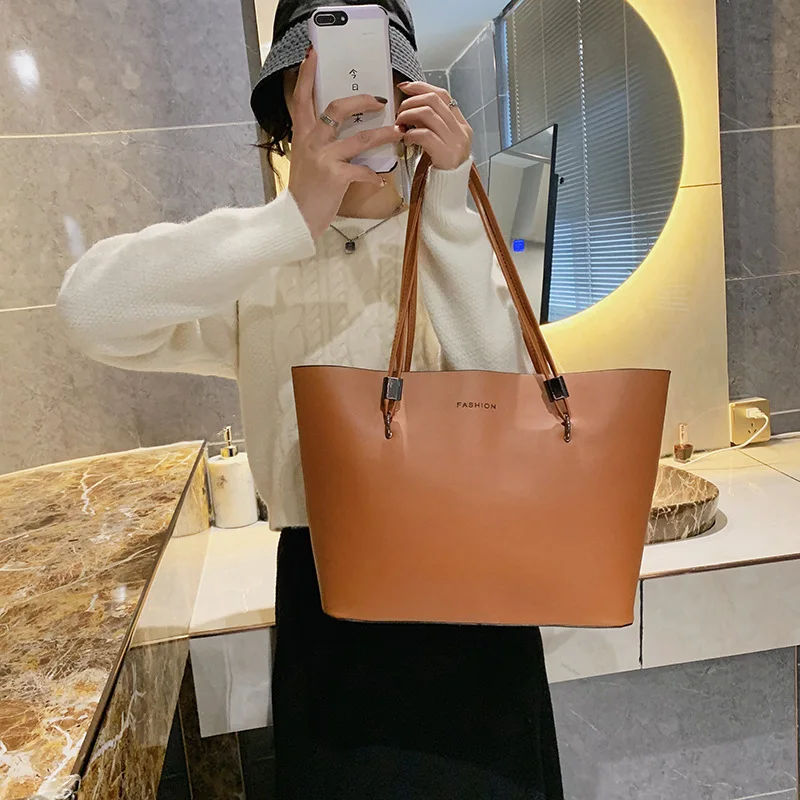
Today’s sustainable materials can be engineered to deliver exceptional performance in these areas. Plant-based leathers often provide natural water resistance, while recycled materials frequently offer superior strength-to-weight ratios. For professionals concerned about durability, many vegan leather options now rival real leather in longevity when properly maintained.
Top Eco-Friendly Work Bag Brands and Their Innovations
The market for sustainable professional accessories has evolved dramatically, with several brands creating exceptional non-leather work bags that meet high standards for both ethics and aesthetics. These companies demonstrate how innovation can elevate eco-friendly alternatives to premium status:
Matt & Nat
- Material Innovation: Pioneered the use of recycled nylon linings made from plastic bottles
- Standout Model: The “Brave” briefcase features clean architectural lines with ample organization
- Key Features: Crossbody strap option, exterior document pocket, multiple laptop sizes
- Sustainability Commitment: Continually testing new recycled and bio-based materials
Stella McCartney
- Material Innovation: Using Alter-Nappa, a polyester and polyurethane blend with recycled polyester backing
- Standout Model: Falabella Business Bag with signature chain detailing
- Key Features: Professional structure, vegetable-based coating, recycled metal hardware
- Sustainability Commitment: Complete animal product-free supply chain and operations
Corkor
- Material Innovation: Specializes in premium cork leather from sustainably harvested Portuguese cork oak
- Standout Model: Cork Briefcase with minimalist design and maximum functionality
- Key Features: Naturally water-resistant, extremely lightweight, develops character over time
- Sustainability Commitment: Supporting traditional cork harvesting communities and techniques
Angela Roi
- Material Innovation: Uses EPUL (Exquisite Polyurethane Leather) engineered for durability
- Standout Model: Hamilton Tote with structured silhouette and convertible design
- Key Features: Scratch-resistant exterior, microfiber lining, metal feet protection
- Sustainability Commitment: PETA-approved manufacturing and ethical factory conditions
Doshi
- Material Innovation: Microfiber vegan leather with bio-based components
- Standout Model: Professional Briefcase with traditional aesthetic in modern materials
- Key Features: Multiple compartments, reinforced handles, customizable interior
- Sustainability Commitment: Carbon-neutral shipping and plastic-free packaging
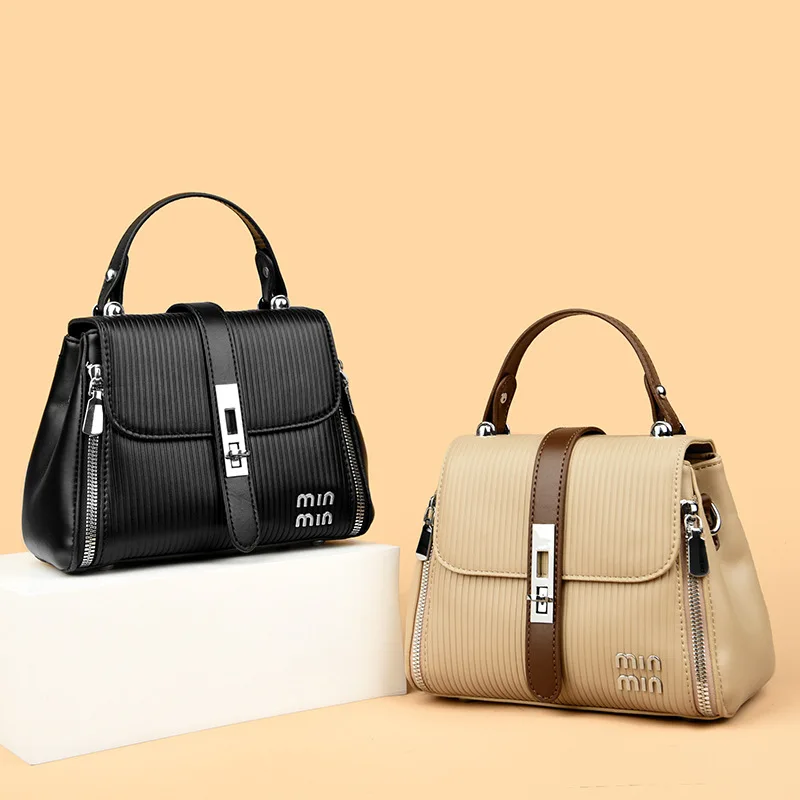
Our collection features a range of non-leather work bags designed for the modern professional who values sustainability without compromising on function or style. Whether you prefer a vegan leather work tote for versatility, a structured vegan leather briefcase for formal settings, or a comfortable vegan leather messenger bag for a more casual professional look, there are exceptional options available.
Black Leather Satchel, Brown Leather Satchel, Vegan Leather Work Tote
Price range: $69.58 through $73.23 Select options This product has multiple variants. The options may be chosen on the product pageBlack Leather Messenger Bag, Black Leather Work Tote, Faux Leather Work Tote
$101.88 Select options This product has multiple variants. The options may be chosen on the product pageBlack Leather Work Tote, Faux Leather Work Tote, Women's Leather Business Tote
Price range: $88.81 through $93.85 Select options This product has multiple variants. The options may be chosen on the product pageBlack Leather Satchel, Faux Leather Work Tote, Vegan Leather Work Tote
$120.38 Select options This product has multiple variants. The options may be chosen on the product pageMen's Slim Leather Briefcase, Slim Leather Laptop Briefcase, Vegan Leather Briefcase
Price range: $120.82 through $131.11 Select options This product has multiple variants. The options may be chosen on the product pageClassic Laptop Briefcase, Vegan Leather Briefcase
$244.29 Select options This product has multiple variants. The options may be chosen on the product page
For professionals seeking traditional styling in sustainable materials, our selection of faux leather work totes provides the refined appearance expected in corporate environments with the ethical benefits of cruelty-free materials.
The Professional’s Guide to Selecting Your Ideal Sustainable Bag
Finding your perfect eco-friendly work bag requires balancing personal needs with environmental priorities. Follow this framework to make a choice that serves both your professional requirements and values:
Step 1: Assess Your Daily Carrying Needs
- What specific items must you transport daily? (Laptop size, documents, lunch, etc.)
- How do you commute? (Walking demands comfort, cycling requires security)
- What’s your typical day structure? (Multiple locations vs. office-based)
- Do you attend client meetings or formal presentations regularly?
Step 2: Identify Your Material Priorities
- Is water resistance essential for your climate or commute?
- Do you prioritize lightweight materials to reduce strain?
- How important is a traditional leather-like appearance in your workplace?
- Which environmental aspects matter most? (Biodegradability, recycled content, chemical reduction)
Step 3: Set Realistic Investment Expectations
Quality sustainable bags often require greater initial investment but deliver superior value over time. Consider:
– Cost-per-use calculation: A $180 bag used 200 days/year for 3 years = 30 cents per use
– Replacement frequency compared to lower-quality alternatives
– Professional image value in client-facing roles
Step 4: Verify Sustainability Claims
Look for credible verification through:
– Specific material information (vague terms like “eco-friendly” without details are red flags)
– Recognized certifications (Global Organic Textile Standard, Bluesign, PETA-Approved Vegan)
– Transparent supply chain information
– Detailed sustainability reports or commitments
The decision framework for selecting professional briefcases applies equally well to eco-friendly alternatives, with additional consideration given to material properties and environmental impact.
Caring for Non-Leather Work Bags: Extending Lifespan and Sustainability
Proper maintenance dramatically extends the useful life of sustainable bags, maximizing their environmental benefits. Care requirements vary by material type:
General Maintenance Principles
- Store properly when not in use (stuffed to maintain shape, dust bag protection)
- Clean spills immediately to prevent setting
- Avoid prolonged direct sunlight exposure
- Empty and clean interior regularly
Plant-Based Leather Care
- Clean with mild soap and damp cloth
- Allow to air dry completely before storage
- Apply specific plant-based leather conditioners (avoid petroleum-based products)
- For Piñatex and similar materials, avoid soaking or machine washing
Recycled Fabric Care
- Spot clean with gentle detergent
- Use soft brushes rather than abrasive cloths
- Water-resistant sprays can be applied to most recycled polyester materials
- For stubborn stains, consult material-specific guides
Cork and Natural Material Care
- Wipe with damp cloth and mild soap
- Natural cork conditioners help maintain water resistance
- Avoid alcohol-based cleaners which can dry out natural materials
- Re-apply water and stain repellent annually
Understanding messenger bag material considerations provides additional insight into maintaining these specific bag styles for maximum durability.
FAQ: Addressing Common Concerns About Non-Leather Work Bags
Are eco-friendly bags as durable as leather?
Many modern sustainable materials offer comparable or superior durability to leather. Plant-based options like cactus leather demonstrate excellent abrasion resistance, while quality vegan leathers won’t crack or peel when properly maintained. The key is selecting premium-grade alternatives rather than basic synthetic options.
How do I verify if a bag is truly sustainable?
Look beyond marketing terms to specific material details, production methods, and third-party certifications. Transparent brands provide clear information about material sourcing, manufacturing processes, and environmental impact measurements. Be particularly cautious of brands that make environmental claims without specific supporting information.
Can plant-based leather alternatives handle rain and weather?
Many plant-based materials offer excellent natural water resistance. Cork, for example, is inherently water-repellent, while materials like Piñatex typically receive environmentally friendly coatings that provide weather protection. Most quality alternatives perform well in light rain, though prolonged submersion should be avoided.
Will these materials look professional enough for corporate environments?
Absolutely. Premium sustainable materials are now being used by luxury brands specifically for their refined appearance. Many colleagues and clients won’t even recognize that your bag isn’t traditional leather unless you choose to highlight its sustainable properties.
Are sustainable bags worth the higher price point?
Quality eco-friendly bags typically offer excellent value over time due to their durability and timeless design. They also maintain their appearance longer than lower-quality options, representing your professional image consistently throughout their lifespan. The environmental benefits provide additional value beyond the physical product.
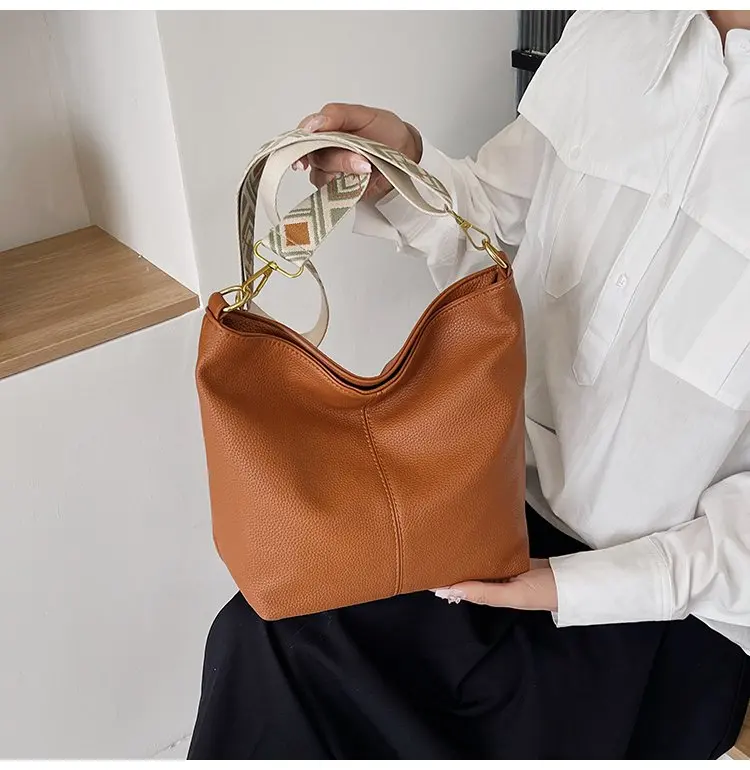
Beyond the Bag: Creating a More Sustainable Professional Life
Your choice of an eco-friendly work bag represents one meaningful step toward a more sustainable professional life. This single decision connects to a broader ecosystem of conscious choices that collectively create significant positive impact.
Consider complementing your sustainable bag with other eco-conscious office accessories: recycled paper notebooks, refillable pens, reusable water bottles, and ethically produced tech accessories. These items not only reduce your environmental footprint but also spark conversations that can inspire colleagues.
The professional landscape is increasingly embracing sustainable alternatives. Many forward-thinking companies now appreciate employees who demonstrate environmental consciousness, recognizing that these values often translate into innovative problem-solving and conscientious decision-making in other aspects of business.
As professionals increasingly choose sustainable options, we collectively influence manufacturing priorities and accelerate innovation in materials science. The comparison with traditional leather laptop bags demonstrates how far sustainable alternatives have come—and hints at the exciting innovations still ahead.
Environmental Impact Comparison: Traditional Leather vs. Alternatives
Understanding the comparative environmental impacts helps professionals make informed choices aligned with their specific values and priorities:
| Environmental Factor | Traditional Leather | Conventional Synthetic Leather | New Eco Alternatives |
|---|---|---|---|
| Water Usage | Very High (up to 40,000L per kg) | Moderate | Low to Very Low |
| Carbon Footprint | High (livestock + tanning) | Moderate to High (petroleum-based) | Low to Moderate |
| Chemical Usage | Intensive (chrome tanning) | Intensive (plasticizers, stabilizers) | Minimal to Moderate |
| Biodegradability | Yes, but slowly and with chemical concerns | No | Varies (plant-based: yes, recycled: no) |
| Resource Renewal | No (limited supply) | No (petroleum-based) | Often Yes (plant-based, recycled) |
This comparison reveals important nuances. While traditional leather biodegrades, its production typically involves significant environmental costs through water usage, land use for livestock, and chemical-intensive tanning processes. Conventional synthetic alternatives eliminate these issues but introduce concerns about petroleum dependence and microplastic pollution.
The newest eco alternatives often provide the best balance by utilizing renewable resources, minimizing chemical processing, and in many cases, offering biodegradability. The ideal choice depends on which environmental factors you personally prioritize, along with your practical needs and aesthetic preferences.
At Poise Porter, we understand that today’s professionals seek accessories that reflect both their aesthetic standards and ethical values. Our curated selection includes options that satisfy both requirements without compromise, allowing you to carry your professional essentials with both confidence and conscience.

